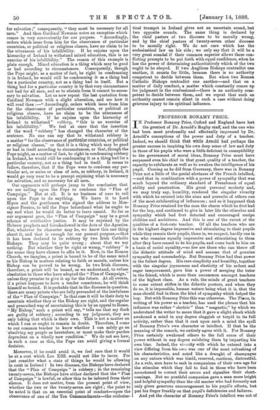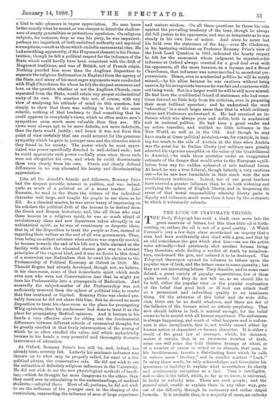PROFESSOR BONAMY PRICE.
IN Professor Bonamy Price, Oxford and England have lost the greatest of Dr. Arnold's Rugby staff, and the one who had been most profoundly and effectually impressed by Dr. Arnold's conceptions of the power and duty of a teacher. Indeed, we should think that while Arnold had perhaps the greater success in inspiring his own deep sense of law and duty in those of his pupils who were a little deficient in susceptibility to the government of moral ideas, Bonamy Price must have surpassed even his chief in that great quality of a teacher, the capacity to exhilarate as well as to awaken the intelligence of his pupil. Coming as he did from Guernsey, there was in Bonamy Price not a little of the genial alertness of the French intellect, —and that in combination with a power of sympathy that was much beyond the ordinary standard of Frenchmen of equal ability and penetration. His great personal modesty and, we may truly say, humility, rendered the singular vivacity with which he entered into the aims and pursuits of others one of the most exhilarating of influences ; and so it happened that Bonamy Price retained for the man the charm which he first had for the boy, and continued to give in later life the stimulus and sympathy which had first detected and encouraged unripe abilities and ambitions. And this is one of the rarest of the qualities of a first-rate teacher. Of all the teachers who are in the highest degree impressive and stimulating to their pupils while they remain their pupils, there is, we suspect, hardly one in ten who remains equally impressive and stimulating to them after they have ceased to be his pupils, and come back to him on
a basis of social equality,—so few are there who can throw off the didactic attitude of mind and assume that of genuine sympathy and comradeship. But Bonamy Price had that power in the fullest degree. His rare simplicity and humility, together
with the singular joyousness and elasticity of his ardent and eager temperament, gave him a power of merging the tutor in the friend, which is more than uncommon amongst teachers of the highest class. As a rule, the minds of great teachers to some extent stiffen in the didactic posture, and when they do so, it is impossible, human nature being what it is, that the man should find in them the kind of sympathy which helped the boy. But with Bonamy Price this was otherwise. The Times, in writing of his power as a teacher, has used the phrase that his influence was rather " electric " than "magnetic," by which we understand the writer to mean that it gave a slight shock which awakened a mind in any degree sluggish or torpid to its full activity, rather than that it cast upon such a mind the spell of Bonamy Price's own character or intellect. If that be the meaning of the remark, we entirely agree with it. For Bonamy Price certainly awakened others to the fall sense of their power without in any degree subduing them by imparting his own bias. Indeed, the vivacity with which he entered into a view differing from his own was one of the most refreshing of his characteristics, and acted like a draught of champagne on any nature which was timid, reserved, cautious, distrustful. As a rule, men have to seek in companions of their own age for the stimulus which they fail to find in those who have been accustomed to correct their errors and signalise their short- comings. But no youthful companion gave a man more bright and helpful sympathy than the old master who had formerly not only given generous encouragement to his pupil's efforts, but put his finger frankly on that pupil's deficiencies and failures.
And yet the character of Bonamy Price's intellect was not of a kind to take pleasure in vague appreciation. No man knew better exactly what he meant, or was sharper to detect the shallow- ness of empty generalities or pretentious mysticism. On religious subjects, for instance, deep as was his piety, he was impatient, perhaps too impatient, of both undefined authority and mystical assumptions,—such as those which underlie sacramental rites. He had something, apparently, of the Huguenot element in his Protes- tantism, though he felt a political respect for the influence of the State which could hardly have been consistent with the drift of Huguenot traditions, and was of British, not of French origin. Nothing puzzled him more than the Anglican disposition to separate the religions Reformation in England from the agency of the State, and many of his most eager arguments were conducted with High Churchmen for whom he felt the deepest reverence and love, on the question whether or not the Anglican Church, once separated from the State, would retain any proper ecclesiastical unity of its own. We mention this not, of course, with any view of analysing his attitude of mind on this question, but simply to show that there was nothing in him of the mere eclectic, nothing of that tendency to find something that he could approve in everybody's views, which so often makes men's sympathies seem much more valuable than they are. His views were always apt to be more definite, not more indefinite, than the facts would justify ; and hence it was not from this point of view certainly that one could account for the generous sympathy which he gave to younger men and the stimulus which they found in his society. The power which he most appre- ciated was power specifically directed to well-defined ends ; but he could appreciate such power cordially even when those ends were not altogether his own, and when he could discriminate them very clearly from his own. Frank and clearly defined differences in no way alienated his hearty and discriminating appreciation.
Like all Dr. Arnold's friends and followers, Bonamy Price had the deepest possible interest in politics, and was, indeed, quite as much of a political as of a moral teacher. Like Socrates, he read in the State the virtues of the individual character writ large, and taught his pupils to see them as he did. As a classical master, he was never weary of impressing on his scholars the political drift of the lessons to be derived from the Greek and Roman historians, and, like all those who read these lessons in a religious spirit, he was as much afraid of revolutionary ideas and new departures taken abruptly in an unhistorical spirit, as he was of reactionary or despotic ideas, that is, of the disposition to treat the people as foes, instead of regarding their welfare as the end of all wise government. Thus, from being an ardent reformer when reform was urgently needed, he became towards the end of his life not a little alarmed at the facility with which the educated classes gave way to abstract principles of the vaguest kind, and it was no doubt to this dread of a somewhat raw Radicalism that he owed his election to the Professorship of Political Economy at Oxford in 1868. Mr. Thorold Rogers had already developed, though not, we believe, in his class-room, some of that iconoclastic spirit which made even men who were not Conservatives fear that he might yet turn his Professorship into a propaganda of Radicalism. And assuredly the subject-matter of the Professorship was not sufficiently removed from the sphere of political bias, to render that fear irrational or bigoted. Bonamy Price was elected pro- bably because he did not share this bias. But he showed no more disposition to treat his class-room as the place for propagating Whig opinions, than his predecessor had done to treat it as the place for propagating Radical opinions. And it became in his hands a very effective sieve for sifting out the fundamental differences between different schools of economical thought, for he greatly excelled in that lively interrogation of the young of which he so often extolled the value, and which undoubtedly became in his hands a very powerful and thoroughly Socratic instrument of education.
At Oxford, Bonamy Price's loss will be, and, indeed, has already been, severely felt. Latterly his academic influence was thrown on to what may be properly called, for want of a less political phrase, the conservative side. He did not wish to see the extinction of definitely religious influences in the University. Be did not wish to see the new physiological methods of teach- ing,—whieh he thought far more dangerous to the ethics, than they could ever be stimulating to the understandings, of medical students,—adopted there. Most of all, perhaps, he did not wish to see the influence of the younger men in the shaping of the curriculum, superseding the influence of men of large experience
and mature wisdom. On all these questions he threw his vote against the prevailing tendency of the time, though he always did full justice to his opponents, and was as temperate as he was steady in his own line of action. And since he never lost his hold over the statesmen of the day,—even Mr. Gladstone, in his bantering criticism on Professor Bonamy Price's view of the Irish Land Question in 1881, indicated the hearty respect he felt for the economist whose judgment he rejected,—his influence at Oxford always counted for a good deal even with his opponents, all the more because, as a layman and a Broad Churchman, that influence was never ascribed to sacerdotal pee. possessions. Hence, even in academical politics he will be sorely missed,—by his allies because he was cautions without being narrow, by his antagonists because he was fair and courteous with- out being weak. But in a larger world he will be still more missed. He had been the confidential friend of statesmen who had some- times derived no little help from his criticism, even in preparing their most brilliant speeches ; and he understood the word "education" in a much larger sense than that in which ordinary tutors and Professors understand it. He had exercised an in- fluence which was always pure and noble, both in academical and in national politics. He had been a great reader and an active traveller, and wielded no little influence in the New World, as well as in the Old. And though he may have made at times political mistakes,—as, for example, in lean- ing too much to the side of Austria at the time when Austria was the great bar to Italian liberty (yet military men greatly admired his vigorous pamphlet on the value of the Quadrilateral to Austria),—he made these mistakes under an exaggerated estimate of the danger that would arise to the European equili- brium from any too sudden upheaval of new national forces. At heart he was a true Liberal, though latterly a very cautious one,---for he saw how formidable in their reach were the new revolutionary tendencies. Indeed, few of our great teachers have exerted a greater influence than he in both widening and purifying the sphere of English liberty, and in deepening the sense of that moral responsibility whereby liberty gains in dignity and influence, much more than it loses by the restraints to which it voluntarily submits.







































 Previous page
Previous page